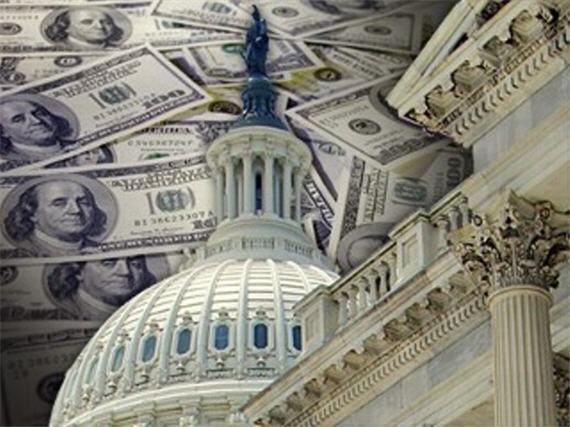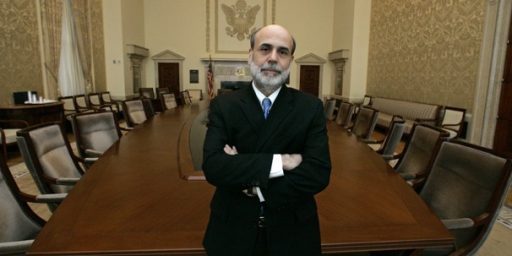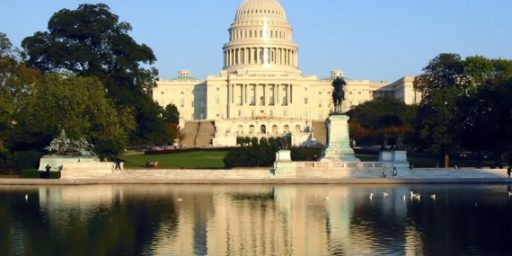President Obama Orders 1 Percent Pay Hike to Avoid 34 Percent Pay Hike
Federal civilian employees are set to get a 34 percent pay raise. The mean old man in the White House is taking it away.
Federal civilian employees are set to get a 34 percent pay raise. The mean old man in the White House is taking it away.
WaPo (“Obama writes Congress in support of 1 percent pay raise for federal employees“):
President Obama told congressional leaders late Friday that he intends to give federal employees a 1 percent pay raise starting Jan. 1 because Congress has taken no action on the issue.
My initial reaction to that was “under what possible Constitutional authority?” Then I read the next paragraph:
Obama had announced in his budget plan in April that he wanted to end a nearly three-year pay freeze for the federal workforce. But since Congress has not passed a spending plan for fiscal 2014, the president is required by the end of August to come up with an “alternative pay plan” to avoid a legal trigger that would automatically raise federal pay in line with private-sector salaries. That trigger could, in theory, give federal workers a raise of about 34 percent.
Now, as a brand new federal employee, I’d be quite pleased, indeed, with a raise of about 34 percent. Hell, round it down to 30. I’m not greedy. But, obviously, that would be a stupid and counterproductive move at a time where the private economy isn’t producing a lot of jobs—making it easier for the government to find quality applicants—and when fiscal pressures have us furloughing employees and considering reductions in force to save money.
More importantly, why do we have so many bizarre triggers in our law that automatically do things we absolutely don’t want to happen unless somebody takes emergency action to stop them?







Umm…because we have a spineless Congress that doesn’t want to address the issues involved with governing and have had such a Congress for about 20 or so years that I can recall?
Just blue skying here…
@just ‘nutha ig’rant cracker: Well, sure. But wouldn’t it make more sense to have the laws operate on autopilot—that is, the consequence of doing nothing being continuing the status quo—rather than triggering things that the Congress clearly doesn’t want automatically? I can’t think of a lot of examples off the top of my head –the “doc fix” comes to mind—but it seems like there are a lot of these.
Because as Winston Churchill once said, “Americans can always be counted on to do the right thing…after they have exhausted all other possibilities.”
@James Joyner: The AMT fix was another. Also the R&D tax credit and very high section 179 amounts are renewed every year. The law’s lousy with these 🙁
If anyone believes that government salaries at 34% below private sector salaries, they haven’t worked in the private sector
@edmondo: It differs wildly. At the top of the chain, at the Senior Executive level, pay’s way below private sector.
I don’t have time to research this this morning but my guess is that the 34% comes from deferred cost of living raises. The federal civilian sector has been getting hosed there over the last 20-30 years. Compare uniformed military pay to that of their rank-equivalent civil service counterparts.
@edmondo:
I can’t speak to every profession, but the engineers that I know who were federal employees often got pay raises in that range if they left the government went to work for private employers. Of course, this was a high demand/low supply field. YMMV.
@edmondo: You’re right. The disparity for accountants and auditors is actually quite a bit more than 34%.
I hate to bring partisanship into this, but heck, it belongs here. The Repubs (as opposed to the ever decreasing number of plain old Republicans) in congress are incapable of actually governing. Votes on abortion, tax cuts for the wealthy, endless attempts to repeal Obamacare, that’s all they are good for. Actually spending the time to understand a complex legislative issue? Not so much.
@James Joyner:
Yeah, that conservative think tank over at Mother Jones begs to differ with you
http://www.motherjones.com/kevin-drum/2012/01/chart-day-federal-government-pay-vs-private-sector-pay
@edmondo: I’m not seeing the disconnect with Kevin’s post. I blogged about the same study and concluded:
I also blogged about the differential in 2010 and again in 2011. A lot of it comes down to how one compares the numbers.
@Gromitt Gunn: http://www.wral.com/wood-says-she-is-having-trouble-hanging-onto-auditors/12745567/
There were times when I got a pay raise and wound up making less – because of tax bracket creep. Of course today it is getting harder to keep from falling behind: flat wages and increasing prices in necessities such as food.
@Tyrell:
I hear this all the time – but just not sure how that can happen with marginal tax brackets – only the last dollars get the highest rates – unless AMT kicked in – but that’s far more rare than this meme. And if the cost of food and other necessities is an issue, I assure you AMT is not one.
@Tony W: The only way I can think of would be if a raise took affect with the first paycheck of the year *and* new withholding tables started up that paycheck, as well. It would give the appearance of the raise causing take-home pay to drop to someone who didn’t understand the difference between causation and correlation.
@Gromitt Gunn: It is a sad sad indication of the poor quality of US journalism that this belief that a pay raise can cause you to earn less because of tax bracket creep seems to be “accepted truth” among commentators. Certainly when a politician, usually a Republican, spouts this nonsense it goes completely unchallenged. And I’m not talking Fox News here, whose purpose is to confuse their audience, I’m talking about real journalists. Even NPR.
“Fiscal” pressures do not have us furloughing employees and reducing workforces to save money, since we have no need to save much money — indeed, we should be spending even more money than we are. It is political pressures, not fiscal pressures, that are responsible for the sequestration.